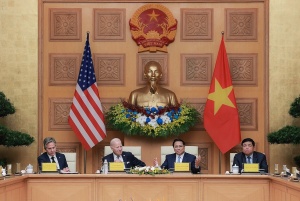Vietnam goes long on semiconductors
| Vietnam goes long on semiconductors, Photo: Shutterstock |
Amkor Technology, a global powerhouse in the semiconductor industry from South Korea, has officially inaugurated its state-of-the-art facility at the Yen Phong II-C Industrial Zone in the northern province of Bac Ninh. This establishment is pegged as the world’s largest semiconductor factory within the Amkor Group’s portfolio.
Back in November 2021, the South Korean conglomerate made the decisive move to invest in a semiconductor manufacturing, assembly, and testing facility at the same location.
With an initial investment hovering around $530 million, the plant spans an impressive 23 hectares. The company’s commitment does not end there. By 2035, Amkor has vowed to bolster its investment to an approximate $1.6 billion.
“After nearly two years of construction, we are thrilled to see our vision come to life as the factory is now fully operational,” said Susan Y. Kim, vice president of Amkor Group.
“Amkor Bac Ninh is set to become a pivotal anchor in our global semiconductor operations network. This endeavour not only underscores our commitment to sustainable development in the semiconductor sector but also paves the way for fostering a robust semiconductor ecosystem in Vietnam.”
Essentra Components, a powerhouse in the global industrial components sector with British roots, last week also unveiled its ambitions to strengthen its position in Vietnam. Though its venture in the country began in 2022, the firm now aims to deepen its local market penetration.
Scott Fawcett, CEO of Essentra Components, said, “As manufacturers diversify their supply sources, they seek partners who meet global standards. Our expansion in Vietnam ensures top-notch service that aligns with the needs of our global clientele.”
Prior to the Amkor and Essentra Components announcement, Hana Micron, another South Korean heavyweight, launched a $600 million semiconductor facility in the northern province of Bac Giang.
The first phase of Hana Micron’s factory has been operational since November 2020, and its current operations denote phase II.
Choi Chang Ho, chairman of Hana Micron, revealed plans to elevate their investment in Vietnam to $1 billion by 2025. “By then, we anticipate Hana Micron Vietnam to generate a yearly revenue nearing $800 million, providing employment for over 4,000 workers. Hana Micron Vina is primed to be the leading manufacturing base in our global operations,” Ho said.
Beyond these names, tech giants such as Intel and Marvell have also made considerable strides in Vietnam. While Intel boasts a $1.5 billion factory in Ho Chi Minh City, Marvell recently publicised the establishment of its Microchip Design Centre in the same city, coupled with plans for further investments in the country.
Other significant players like Renesas, Applied Micro, Synopsys, NXP Semiconductors, and Hanmi Semiconductor have also marked their presence with varied investment and business activities in Vietnam.
The consecutive investments from industry titans like Intel, Amkor, Hana Micron, and Marvell have certainly put Vietnam on the semiconductor industry’s radar. However, the nation’s potential transcends mere acknowledgements. Vietnam is poised to dive deeper into the global semiconductor supply chain, nurturing and expanding its own semiconductor industry.
Arnaud Ginolin, general director of Boston Consulting Group Vietnam, expressed his enthusiasm. “Vietnam’s foray into the semiconductor realm needs to be audacious and pragmatic. It’s imperative to discern the key segments, establish concrete visions, implement plans, and draft policies that act as catalysts,” he said.
Alongside global heavyweights, local Vietnamese entities, such as FPT, are also joining the semiconductor sector’s bandwagon.
FPT’s chairman Truong Gia Binh last week also revealed the company’s ambitious plan, “Our immediate goal is to strengthen our talent pool with 10,000 individuals, potentially increasing to as many as 20,000-30,000 annually.”
In September, FPT disclosed significant orders for 67 million chips for 2024 and 2025, serving clients from Taiwan, South Korea, and Japan. This followed their transition to full-scale production of power management integrated circuit products.
“We aim to supply 25 million chips globally in 2024 and 2025,” Binh said.
Vietnam’s FPT Semiconductor JSC in late September collaborated with US-based Silvaco to bolster human resources, setting sights on launching a training hub in Vietnam and delving deeper into advanced technological sectors.
Last month, Vietnam’s National Innovation Centre under the Ministry of Planning and Investment and US-backed Cadence Design Systems inked an MoU to bolster the design and development capabilities of semiconductor chips in Vietnam.
Additionally, the NIC has also signed an agreement with Arizona State University, on the development of a skilled workforce for Vietnam’s semiconductor industry. Concurrently, Vietnam’s Ministry of Education and Training partnered with Intel Corporation in an MoU dedicated to nurturing talent for high-tech sectors.
Research firm Technavio underscores Vietnam’s potential, predicting the semiconductor market in the country will grow by $1.65 billion between 2021 and 2025, a growth rate of roughly 6.5 per cent annually.
Giants like Intel, Samsung, and Synopsys have established bases in Vietnam, and domestic firms such as FPT are also joining the race.
However, the country’s rapid growth highlights a challenge: a shortage of skilled labour. Economist Tran Du Lich noted, “Vietnam’s semiconductor sector will need about 50,000 engineers over the next five years.”
“Despite playing a pivotal role in the semiconductor arena, Vietnam’s focus has been on assembly, testing, and packaging. The nation’s talent pool is a significant bottleneck. With a workforce of just 5,000 engineers, the country is a minnow in a multi-billion-dollar market,” Lich said. “Where will the talent come from if we can’t train them swiftly?”
 | Vietnam and US companies collaborate on semiconductors and innovation High-level meetings between the US and Vietnam have paved the way for a strategic partnership focusing on the technology sector, with semiconductors and innovation at the forefront. |
| Semiconductors a future key industry of Vietnam To maintain a high growth rate of exports, it was necessary to target new trends, including semiconductors, said experts. |
 | Amkor opens mega factory for semiconductors in Vietnam On October 11, the US semiconductor product packaging and test services provider Amkor Technology opened a mega factory for semiconductor assembly and testing in the northern province of Bac Ninh. |
What the stars mean:
★ Poor ★ ★ Promising ★★★ Good ★★★★ Very good ★★★★★ Exceptional
Related Contents
Latest News
More News
- SK Innovation-led consortium wins $2.3 billion LNG project in Nghe An (February 25, 2026 | 07:56)
- THACO opens $70 million manufacturing complex in Danang (February 25, 2026 | 07:54)
- Phu Quoc International Airport expansion approved to meet rising demand (February 24, 2026 | 10:00)
- Bac Giang International Logistics Centre faces land clearance barrier (February 24, 2026 | 08:00)
- Bright prospects abound in European investment (February 19, 2026 | 20:27)
- Internal strengths attest to commitment to progress (February 19, 2026 | 20:13)
- Vietnam, New Zealand seek level-up in ties (February 19, 2026 | 18:06)
- Untapped potential in relations with Indonesia (February 19, 2026 | 17:56)
- German strengths match Vietnamese aspirations (February 19, 2026 | 17:40)
- Kim Long Motor and AOJ Suzhou enter strategic partnership (February 16, 2026 | 13:27)

 Tag:
Tag:




















 Mobile Version
Mobile Version